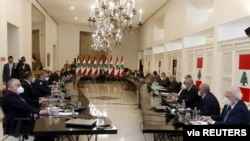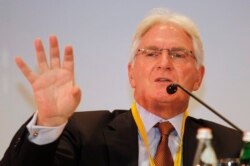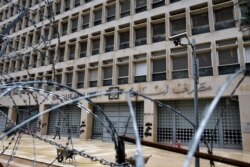Lebanese analysts are calling on the United States and the European Union to impose sanctions on their politicians who they say are subverting the formation of new government. The U.S. and France say Lebanon needs a new government of nonpartisan specialists who will carry out long overdue reforms and steer Lebanon out of its worst financial crisis since its 1975-90 Civil War.
Lebanon’s caretaker government hasn’t yet met the required conditions for a World Bank $246-million loan for social security programs, despite an upcoming deadline.
Continued political bickering is delaying the naming of a new Cabinet, analysts say, and that means many poor and vulnerable families may not get the financial support they desperately need.
Observers say the economic crisis is the gravest threat to Lebanon’s stability since the 15-year civil war that ended in 1990.
The U.S. undersecretary of state for political affairs David Hale, warned earlier this month that Lebanese politicians could face punitive actions from Washington and its European allies, if they continue to delay reforms.
Professor Habib Malik of the Lebanese American University told VOA that the U.S. should step up pressure on entrenched politicians — whom critics describe as a “mafia” — by demanding the recovery of Lebanon’s stolen assets and impose sanctions on them. Malik says the sanctions would also hit the Iran-backed Hezbollah militia.
“Lebanon is hijacked and held hostage by a mafia-militia cartel which is beholden to Iran," he said. "The ultimate victims are the Lebanese people. The U.S. possesses a great deal of information about the stolen money. If the U.S. decides very seriously and methodically to start slapping some of these people across the board with the global Magnitsky Act, that it will put a huge dent, will weaken the mafia a lot and pull the rug out from Hezbollah’s feet.”
Nasser Saidi is a former minister of economy and trade in Lebanon. He says billions of dollars of Lebanon’s stolen assets need to be recovered from abroad. He encourages the U.S. and the European Union to work together on sanctions to target Lebanon’s corrupt politicians and business elite to hold them “accountable for what they’ve done.”
“Part of the sanctions is really part of the stolen assets recovery. And that’s worth by my count at least 20-25 billion," he said. "So, we’re taking about large amounts of money. Now the Europeans have their own equivalent of the Magnitsky Act or something close to that, we can get some coordination and then the politicians in Lebanon will feel the bite. And particularly as you start getting the beginning of the dialogue with Iran and telling Iran you have to hold Hezbollah back and let’s get the reform agenda moving in Lebanon.”
Beirut’s Daily Star newspaper recently reported that “France and the EU are putting together proposals that could see assets frozen and travel bans imposed on Lebanese politicians to push them finally to agree on a government to rescue the country from economic collapse.”
It said that “many senior Lebanese politicians have homes, bank accounts and investments in the EU, and send their children to universities there, so a withdrawal of that access” could strike corrupt officials hard.
Hale told Lebanese officials that “the time to form a government, not block it, is now” as is the needed comprehensive reform. Lebanon’s currency has lost about 90 percent of its value. The government defaulted on its foreign debt last year and nearly half the population has been pushed into poverty and unemployment.






